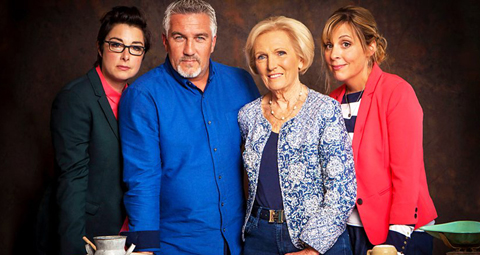January 25 | ![]() 0 COMMENTS
0 COMMENTS ![]() print
print

Bake Off is a rare feat – a piece of popular culture that has a genuinely good social impact
In his Letter from America, Brandon McGinley looks at a TV cookery show and how it inspires family values
My wife and I here in the US watch the original The Great British Bake Off. When I first discovered the BBC show, now reincarnated as a Channel 4 programme with different presenters, I immediately told my wife, who loves all things British and is a talented baker (you must try her scones and cinnamon rolls). The producers seem to have had her in mind when they created the show.
For my part, I was initially a little disappointed that the show—originally presented by Sue Perkins and Mel Giedroyc, with experts Paul Hollywood and Mary Berry—was a competitive rather than a demonstrative or strictly educational show.
Here in the United States, the airwaves are clogged with reality shows that manufacture drama by setting contestants against one another, highlighting nasty looks and shouting matches.
The last thing I needed, I thought, was to see something as wholesome as baking (especially British baking) so sullied.
Of course, Bake Off is nothing like that, which I soon learned, and to which can be attributed much of its charm and success. The spirit of co-operation and shared purpose among the contestants is a balm in a culture where coarseness and interpersonal hostility are thought to be the only ways to attract an audience.
There is something distinctively American about the cultural obsession with competition and backbiting.
More than among most peoples, affection for competition is coded into our cultural DNA; the idea that from competition comes strength and dynamism and few drawbacks worth mentioning is a piece of dogma that migrated from economics to everything from parenting to entertainment.
And yet probably the most famous American food-themed competition show stars a British import: Gordon Ramsay, whose Hell’s Kitchen is, remarkably, in its 18th season.
The producers and editors manufacture ridiculous controversies and the contestants are clearly encouraged to behave badly—and are happy to do so for the attention it gets them (of course, as with all of Ramsay’s media appearances, throughout the show his prickly exterior is pared away to reveal a warm heart, and most of the contestants come to like him, and so on, and so on.)
On The Great British Bake Off, however, the producers made the radical decision not only to avoid playing up discord, but seemingly to play up cooperation.
Some of my favourite moments in the show are when one contestant offers to help another whose meringue sculpture is collapsing or whose mince pie has been punctured—and, as often as not, the contestant being assisted is a real contender, and so the help could be costly to the helper.
The result is not just a celebration of cooperation, but a celebration of excellence. And that is what really makes the show so distinctive and so genuinely good (there’s very little in popular culture that I will say that about).
The contestants on the programme are in a shared pursuit of excellence—and not excellence in order to win a cash prize or for some other vulgar end, but excellence in itself.
What makes The Great British Bake Off more compelling than other programs that gesture in this direction, such as American Ninja Warrior about regular but extremely fit people navigating an obstacle course, is that the excellence portrayed is available to just about everyone.
Baking is perhaps the quintessential domestic art: the materials are accessible; the techniques are passed down through generations; the results can be shared and bring real joy to others. Nearly everyone can become as least competent at baking.
It is said that home baking in the United Kingdom has increased markedly since the show’s release. It is a rare feat indeed that a piece of popular culture has not only a genuinely good social impact, but one which reinvigorates organic family and community traditions.
The joy of making something with one’s hands and sharing it with others, whether a cake or a quilt or a chair, has been nearly exterminated in the modern world; it’s not unrealistic to hope that returning that feeling to our homes will bear fruit in other virtuous habits, like hospitality and magnanimity.
As for us, I’ve tried my hand at a few cakes and pastries since watching the show. I’m still more comfortable with a skillet than a Bundt pan, but I’m getting better at not forgetting key ingredients.
I hope to get better over time, with my wife serving as my very own Mary Berry as we pursue excellence (or at least deliciousness) together.
And even if I never do master a Victoria sponge, we’ll at least make a few memories for the kids along the way.










